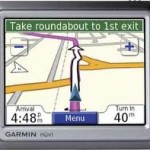Categories
 GPS fleet tracking devices are being used by Washington County highway superintendent John Deakins Jr. to resolve several fleet management issues such as reducing vehicle misuse, improving employee productivity and improving emergency vehicle response time. “All GPS fleet tracking measures have resulted in lower county fuel expenditures and a more capable fleet, not to mention safer roads for Washington County citizens,” said John Deakins Jr., Washington County, TN, highway superintendent.” Once Deakins Jr. saw how much the GPS fleet tracking devices were able to put an end to fleet vehicle misuse, he realized the fleet management devices could also be used to improve employee productivity. (This is Part Two of a 4 Part Article.)
GPS fleet tracking devices are being used by Washington County highway superintendent John Deakins Jr. to resolve several fleet management issues such as reducing vehicle misuse, improving employee productivity and improving emergency vehicle response time. “All GPS fleet tracking measures have resulted in lower county fuel expenditures and a more capable fleet, not to mention safer roads for Washington County citizens,” said John Deakins Jr., Washington County, TN, highway superintendent.” Once Deakins Jr. saw how much the GPS fleet tracking devices were able to put an end to fleet vehicle misuse, he realized the fleet management devices could also be used to improve employee productivity. (This is Part Two of a 4 Part Article.)
Before installing GPS fleet tracking devices, Deakins Jr. had heard several accounts of vehicle misuse, motivating him to research online and purchase the fleet tracking devices. For example, Deakins Jr. recalled one truck driver who was only authorized to drive his truck to and from work everyday. However, the truck driver was using the County owned fleet vehicle for personal errands – about 12 miles on average per day. While this may not sound like a lot, according to Deakins, “These trucks only average 11-12 miles per gallon. So the cost in fuel adds up quickly.”
In addition to the personal use of County fleet vehicles, Deakins Jr. acknowledged there were other issues that almost all fleets deal with, such as long lunch breaks and unauthorized time off during work hours. Thanks to the County’s GPS fleet tracking devices, Deakins Jr. can now monitor a driver’s exact location within roughly 10 – 15 feet. He also set speed limits for fleet trucks and automatically receives notification alerts each and every time a truck driver exceeds that limit.
A fleet GPS system improves productivity. In Washington County, boom mowers are used to maintain the roadside. The GPS fleet tracking units installed in the fleet vehicles allow Deakins Jr. to monitor the boom mower’s progress each day. The GPS system enables Deakins Jr. to know exactly how much work is being completed (or not completed) each day.
In 2009, Washington County purchased four hand-held GPS devices that have proven to be beneficial as well. Following legislation requiring highly reflective safety and directional road signs, Deakins’ crew performed inventory and more than 10,000 signs throughout the County. He assigned three teams of two employees to evaluate and measure each sign, making certain it was the correct distance from the pavement and served its purpose for drivers. Requiring workers to carry a hand-held GPS unit, which provided locations within just a few feet, enabled Deakins Jr. to follow workers in real-time via the internet as they inventoried the signs.
One time, Deakins Jr. said one of his crews wasn’t stopping and getting out of the truck in the correct locations. The crew was using incorrect sizes and directions on the signs. The GPS fleet tracking devices enabled him to identify the problem very quickly and re-route the crew right away. In this example, the GPS system not only made Deakins’ crew more productive, but also ultimately made the roads safer for all Washington County citizens.
This article will be continued in GPS System Cuts Washington County Vehicle Misusage and Improves Productivity – Part Three….
Source: Government Fleet Magazine http://www.government-fleet.com/






